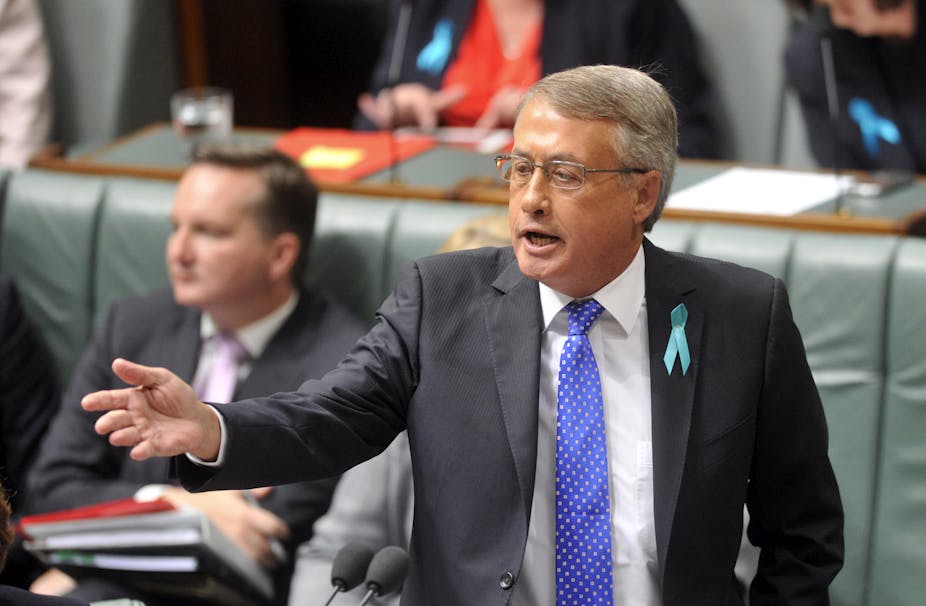It says much about the degeneration of the Australian Labor Party that its priority and target for budget “savings” is poor single mums.
In order to save an estimated $723 million over four years, in January around 80,000 single parents (90% of whom are women) were moved onto Newstart, effectively reducing incomes already considered under the poverty line by between $60 and $110 dollars.
But when it comes to the really rich (mainly men) suckling on the teat of government through disguised spending programs like superannuation tax concessions, Labor hasn’t yet decided what to do, despite knowing of the problem for at least three years.
Superannuation tax concessions cost $30 billion last year in forgone revenue. According to the Treasury in its recently released Tax Expenditures Statement, that figure will skyrocket to $45 billion in 2015/16. The concessions are threefold – low tax rates on contributions to superannuation funds, low tax rates on fund earnings and by and large no tax on retirement streams paid to superannuants when they turn 60.
Like many tax expenditures the benefits of the superannuation tax concessions and exemptions flow overwhelmingly to the rich. For example, the Australia Institute estimates that the top 5% of income earners get one third of the superannuation tax grants, about $10 billion at the moment and rising to $15 billion in 2015/16.
Others like the ACTU have reached much the same conclusion about the unfairness of the superannuation system. Even the Henry Tax Review back in 2010 agreed that the current superannuation tax structure was inequitable and suggested some tinkering.
Yet almost three years after Kevin Rudd and Wayne Swan released the Henry tax Review in May 2010, Labor has made no moves to address this.
If any politician campaigned openly on a program of big grants to the rich and much smaller ones to the poor and less well off, they’d be pilloried from pillar to post. But why does it become okay for government largesse to flow to the rich and powerful when it comes to tax concessions?
Surely it is time to fight back. One option would be to tax the superannuation income stream when paid to superannuants with fund balances greater than $800,000 or $1 million.
But Julia Gillard has already ruled that out. So that leaves the possibility of some sort of increased tax on contributions to funds and or the earnings of funds.
However, it is doubtful Labor has the political will or spine to attack these inequitable concessions. The other difficulty will be in distinguishing between rich and less well off contributors.
Is there an alternative? There were about 2.25 million age pensioners in 2010/11. The age pension is means tested. There are about 3.08 million people aged over 65. Now I am no genius when it comes to figures, but if we added the cost of the pension and the revenue forgone from the superannuation concessions together and divided by 3.08 million, my back of the envelope calculations are that you’d be able to pay every person aged 65 or over $23,000 a year, an increase of about $90 a week on the current payment.
If it were restricted to the 2.25 million current age pensioners then the payment would be around $30,000 a year, an increase of over $200 a week. That would take pensioners out of the poverty zone.
Revenue forgone is not the same as revenue that would be collected if the concessions were abolished. But much of the money currently benefiting from the superannuation tax concession would go into areas taxed at normal rates. If it were to flow into tax preferenced or no tax arrangements (such as negatively geared rental properties) then the time has come to remove these lurks too.
It may seem unfair that millionaires should get the pension but the argument is society recoups it from them during their lifetime of earnings through a steeply progressive income tax, wealth taxes and taxes on wealth transfers. Australia is after all a low tax country and the rich and big business have it easy here.
A more progressive tax system would not only cover any revenue forgone versus collected shortfall alluded to above but also provide the base for increasing the pensions to an even more livable amount fo all over 65, say $30000 a year.
It provides a base too for adequately funding education reforms as the Gonski’s education reforms and a full National Disability Insurance Scheme (NDIS), as well as beginning the move to a fully renewable energy society. It is time to tax the rich so they pay their fair share.
That means for starters getting rid of tax rorts like the superannuation tax concessions that overwhelmingly favour the very wealthy.

